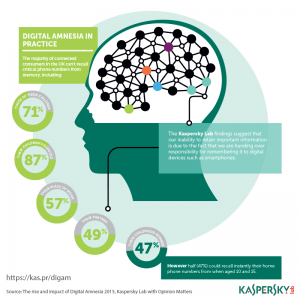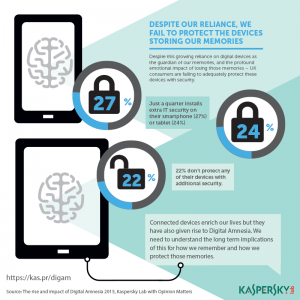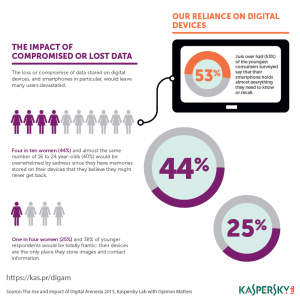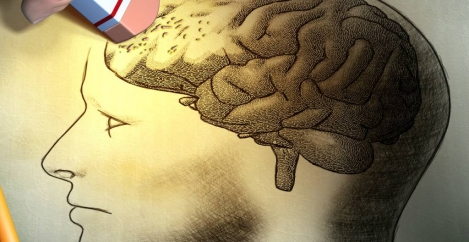July 6, 2015
People are outsourcing their own memories to the Internet, claims report
 We have outsourced our memory to the Internet and digital technology to such an extent that many of us are suffering from digital amnesia. That is the main finding of a new report from software developer Kaspersky Lab. The study of around 6,000 people claims that the seductive ease of access to a bottomless well of information is taking its toll on our natural ability to memorise and recall things for ourselves. Nearly all respondents (91 percent) across all age groups now agree that they “use the Internet as an online extension of their brain”. Around half of people now simply cannot be bothered to remember even basic facts and a quarter cheerfully even forget whatever facts they glean through search engines after they have made use of them. As with many things in the modern world, we are increasingly prone to treat even hard information as disposable.
We have outsourced our memory to the Internet and digital technology to such an extent that many of us are suffering from digital amnesia. That is the main finding of a new report from software developer Kaspersky Lab. The study of around 6,000 people claims that the seductive ease of access to a bottomless well of information is taking its toll on our natural ability to memorise and recall things for ourselves. Nearly all respondents (91 percent) across all age groups now agree that they “use the Internet as an online extension of their brain”. Around half of people now simply cannot be bothered to remember even basic facts and a quarter cheerfully even forget whatever facts they glean through search engines after they have made use of them. As with many things in the modern world, we are increasingly prone to treat even hard information as disposable.
 The authors of the report call this the ‘Google Effect’, and claim it even extends to important personal information. According to the study, the majority of people in the UK apparently can’t now recall important phone numbers from memory, including those of their children (71 percent), children’s schools (87 percent), place of work (57 percent) and partner (49 percent). However, half (47 percent) could recall instantly their home phone numbers when aged 10 and 15, confirming that we are effectively handing over our long term memories to the digital realm.
The authors of the report call this the ‘Google Effect’, and claim it even extends to important personal information. According to the study, the majority of people in the UK apparently can’t now recall important phone numbers from memory, including those of their children (71 percent), children’s schools (87 percent), place of work (57 percent) and partner (49 percent). However, half (47 percent) could recall instantly their home phone numbers when aged 10 and 15, confirming that we are effectively handing over our long term memories to the digital realm.
The study of 6,000 people aged 16 and older in six European countries claims that this inability to retain important information is due to the fact that we are simply handing over responsibility for remembering it to digital devices such as smartphones. Just over half (53 percent) of the youngest consumers surveyed (16 to 24 year-olds) say that their smartphone holds almost everything they need to  know or recall but the study also found evidence of Digital Amnesia across all age groups and equally among both men and women.
know or recall but the study also found evidence of Digital Amnesia across all age groups and equally among both men and women.
Not surprisingly, the study also found that the loss or compromise of data stored on digital devices, and smartphones in particular, would leave many users devastated. Four in ten women (44 percent) and almost the same number of 16 to 24 year-olds (40 percent) would be overwhelmed by sadness since they have memories stored on their devices that they believe they might never get back. One in four women (25 percent) and 38 percent of younger respondents would panic: their devices are the only place they store images and contact information.
According to David Emm of Kaspersky Lab; “Connected devices enrich our lives but they have also given rise to Digital Amnesia. We need to understand the long term implications of this for how we remember and how we protect those memories. The phone numbers of those who matter most to us are now just a click away – so we no longer bother to memorise the details.  Further, an overwhelming 86 percent of those surveyed say that in our increasingly hyper-connected world people simply have too many numbers, addresses, handles etc. for them to remember even if they wanted to. We discovered that the loss or compromise of this precious information would not just be an inconvenience, it would leave many people deeply distressed”.
Further, an overwhelming 86 percent of those surveyed say that in our increasingly hyper-connected world people simply have too many numbers, addresses, handles etc. for them to remember even if they wanted to. We discovered that the loss or compromise of this precious information would not just be an inconvenience, it would leave many people deeply distressed”.
















